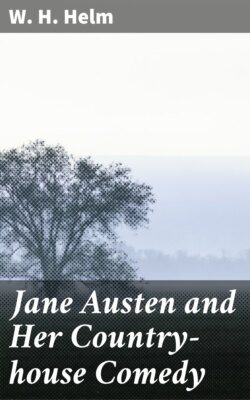Jane Austen and Her Country-house Comedy

Реклама. ООО «ЛитРес», ИНН: 7719571260.
Оглавление
W. H. Helm. Jane Austen and Her Country-house Comedy
Jane Austen and Her Country-house Comedy
Table of Contents
I. DOMINANT QUALITIES
II. EQUIPMENT; AND METHOD
III. CONTACT WITH LIFE
IV. ETHICS AND OPTIMISM
V. THE IMPARTIAL SATIRIST
VI. PERSONAL AND TOPOGRAPHICAL
VII. INFLUENCE IN LITERATURE
BIBLIOGRAPHICAL NOTE
INDEX
Отрывок из книги
W. H. Helm
Published by Good Press, 2019
.....
I doubt if there is any author of any period to whom the most famous remark of Buffon could be more justly applied than to Jane Austen. "Le style est la femme même" is a conviction which becomes more and more firm as one reads her novels and her letters, and reflects over their relationship. Her simple life and her limited opportunities, her genius being granted, are a sufficient explanation of her work. Part of that life, and a part more important, in proportion to the rest, than it would have been in the case of one who had lived less remote from the world of thought and action, was the reading of favourite books. Clarissa, Sir Charles Grandison and Pamela influenced her strongly, but she avoided more than she took from them in the formation of her style. Miss Burney she now and then laughs at a little, as when, after John Thorpe has said to Catherine (who confesses she has never read Camilla): "You had no loss, I assure you; it is the horridest nonsense you can imagine; there is nothing in the world in it but an old man's playing at see-saw and learning Latin; upon my soul, there is not," Jane Austen adds that "the justness" of this critique "was unfortunately lost on poor Catherine." But where she loved she laughed. She appreciated her sister-novelist's work very highly, and she writes of a young woman whom she met at a neighbour's house: "There are two traits in her character which are pleasing—namely, she admires Camilla, and drinks no cream in her tea."
Scott's poetry, of course, Jane read and enjoyed. Three of his most popular novels—Waverley, Guy Mannering, and The Antiquary—appeared during her lifetime, and their authorship, like that of her own works, was not avowed until after her death. How wide-open was the "secret" of their origin from the very first, years before Scott's acknowledgment, we may see in one of Jane's letters of 1814, where she says: "Walter Scott has no business to write novels; especially good ones. It is not fair. He has fame and profit enough as a poet, and should not be taking the bread out of the mouths of other people. I do not like him, and do not mean to like Waverley if I can help it, but I fear I must." She herself declared, half jestingly, that she wrote for fame and not for profit. Neither, in any but shallow measure, was granted to her whilst she lived. She did not, like Robert Burns, "pant after distinction," nor was she of the "pushing" type. The offering-up of self-respect in the cause of self-interest was the least possible of sacrifices with her.
.....